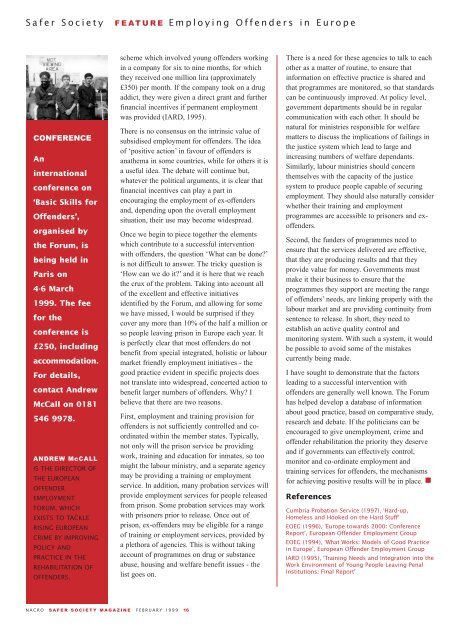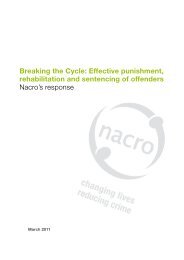Looking at employment - Nacro
Looking at employment - Nacro
Looking at employment - Nacro
Create successful ePaper yourself
Turn your PDF publications into a flip-book with our unique Google optimized e-Paper software.
Safer Society FEATURE Employing Offenders in EuropeCONFERENCEAnintern<strong>at</strong>ionalconference on‘Basic Skills forOffenders’,organised bythe Forum, isbeing held inParis on4-6 March1999. The feefor theconference is£250, includingaccommod<strong>at</strong>ion.For details,contact AndrewMcCall on 0181546 9978.ANDREW McCALLIS THE DIRECTOR OFTHE EUROPEANOFFENDEREMPLOYMENTFORUM, WHICHEXISTS TO TACKLERISING EUROPEANCRIME BY IMPROVINGPOLICY ANDPRACTICE IN THEREHABILITATION OFOFFENDERS.scheme which involved young offenders workingin a company for six to nine months, for whichthey received one million lira (approxim<strong>at</strong>ely£350) per month. If the company took on a drugaddict, they were given a direct grant and furtherfinancial incentives if permanent <strong>employment</strong>was provided (IARD, 1995).There is no consensus on the intrinsic value ofsubsidised <strong>employment</strong> for offenders. The ideaof ‘positive action’ in favour of offenders isan<strong>at</strong>hema in some countries, while for others it isa useful idea. The deb<strong>at</strong>e will continue but,wh<strong>at</strong>ever the political arguments, it is clear th<strong>at</strong>financial incentives can play a part inencouraging the <strong>employment</strong> of ex-offendersand, depending upon the overall <strong>employment</strong>situ<strong>at</strong>ion, their use may become widespread.Once we begin to piece together the elementswhich contribute to a successful interventionwith offenders, the question ‘Wh<strong>at</strong> can be done?’is not difficult to answer. The tricky question is‘How can we do it?’ and it is here th<strong>at</strong> we reachthe crux of the problem. Taking into account allof the excellent and effective initi<strong>at</strong>ivesidentified by the Forum, and allowing for somewe have missed, I would be surprised if theycover any more than 10% of the half a million orso people leaving prison in Europe each year. Itis perfectly clear th<strong>at</strong> most offenders do notbenefit from special integr<strong>at</strong>ed, holistic or labourmarket friendly <strong>employment</strong> initi<strong>at</strong>ives - thegood practice evident in specific projects doesnot transl<strong>at</strong>e into widespread, concerted action tobenefit larger numbers of offenders. Why? Ibelieve th<strong>at</strong> there are two reasons.First, <strong>employment</strong> and training provision foroffenders is not sufficiently controlled and coordin<strong>at</strong>edwithin the member st<strong>at</strong>es. Typically,not only will the prison service be providingwork, training and educ<strong>at</strong>ion for inm<strong>at</strong>es, so toomight the labour ministry, and a separ<strong>at</strong>e agencymay be providing a training or <strong>employment</strong>service. In addition, many prob<strong>at</strong>ion services willprovide <strong>employment</strong> services for people releasedfrom prison. Some prob<strong>at</strong>ion services may workwith prisoners prior to release. Once out ofprison, ex-offenders may be eligible for a rangeof training or <strong>employment</strong> services, provided bya plethora of agencies. This is without takingaccount of programmes on drug or substanceabuse, housing and welfare benefit issues - thelist goes on.There is a need for these agencies to talk to eachother as a m<strong>at</strong>ter of routine, to ensure th<strong>at</strong>inform<strong>at</strong>ion on effective practice is shared andth<strong>at</strong> programmes are monitored, so th<strong>at</strong> standardscan be continuously improved. At policy level,government departments should be in regularcommunic<strong>at</strong>ion with each other. It should ben<strong>at</strong>ural for ministries responsible for welfarem<strong>at</strong>ters to discuss the implic<strong>at</strong>ions of failings inthe justice system which lead to large andincreasing numbers of welfare dependants.Similarly, labour ministries should concernthemselves with the capacity of the justicesystem to produce people capable of securing<strong>employment</strong>. They should also n<strong>at</strong>urally considerwhether their training and <strong>employment</strong>programmes are accessible to prisoners and exoffenders.Second, the funders of programmes need toensure th<strong>at</strong> the services delivered are effective,th<strong>at</strong> they are producing results and th<strong>at</strong> theyprovide value for money. Governments mustmake it their business to ensure th<strong>at</strong> theprogrammes they support are meeting the rangeof offenders’ needs, are linking properly with thelabour market and are providing continuity fromsentence to release. In short, they need toestablish an active quality control andmonitoring system. With such a system, it wouldbe possible to avoid some of the mistakescurrently being made.I have sought to demonstr<strong>at</strong>e th<strong>at</strong> the factorsleading to a successful intervention withoffenders are generally well known. The Forumhas helped develop a d<strong>at</strong>abase of inform<strong>at</strong>ionabout good practice, based on compar<strong>at</strong>ive study,research and deb<strong>at</strong>e. If the politicians can beencouraged to give un<strong>employment</strong>, crime andoffender rehabilit<strong>at</strong>ion the priority they deserveand if governments can effectively control,monitor and co-ordin<strong>at</strong>e <strong>employment</strong> andtraining services for offenders, the mechanismsfor achieving positive results will be in place. ReferencesCumbria Prob<strong>at</strong>ion Service (1997), ‘Hard-up,Homeless and Hooked on the Hard Stuff’EOEG (1996), ‘Europe towards 2000: ConferenceReport’, European Offender Employment GroupEOEG (1994), ‘Wh<strong>at</strong> Works: Models of Good Practicein Europe’, European Offender Employment GroupIARD (1995), ‘Training Needs and Integr<strong>at</strong>ion into theWork Environment of Young People Leaving PenalInstitutions: Final Report’NACRO SAFER SOCIETY MAGAZINE FEBRUARY 1999 16
















